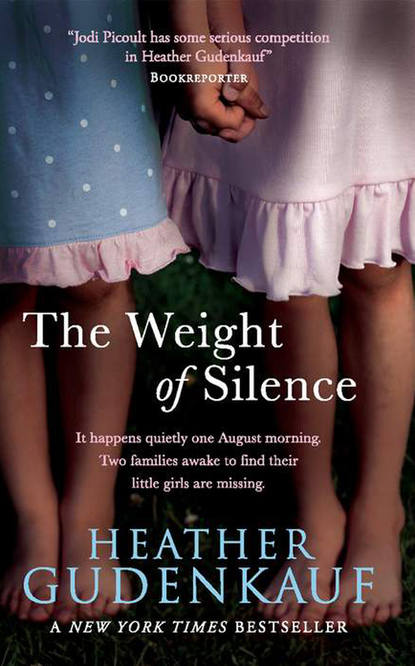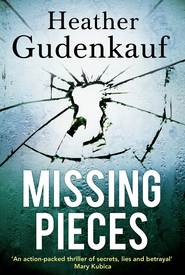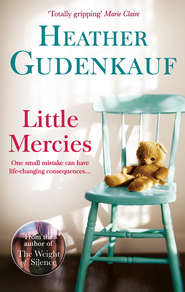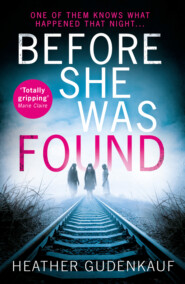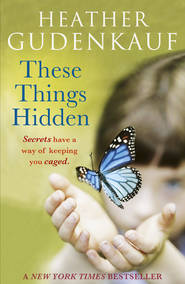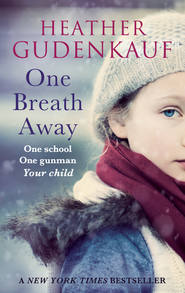По всем вопросам обращайтесь на: info@litportal.ru
(©) 2003-2025.
✖
The Weight of Silence
Автор
Год написания книги
2018
Настройки чтения
Размер шрифта
Высота строк
Поля
“That’s a good idea. I’ll go, too. I’ll call Mrs. Norland to come over and wait, in case they come back. I’ll pack some water, you go call the boys.”
Ben has his hand on the phone when it rings; he pulls back as if shocked, lets it ring again, and then picks it up.
“Hello?” It is a question. “Just a moment, please.” He hands the receiver to me and whispers, “Louis.”
“Lou?” I say, and I find myself getting teary. “Any word?”
“No, nothing yet. I’ve contacted the state police and they’re sending a guy over. He’ll be here in an hour or so. He’ll be wanting to talk to you and Ben and Mr. and Mrs. Gregory, too.” He pauses for a moment. “We’ve tried to contact Griff and Roger Hogan, but can’t get a hold of them. Roger’s wife said his plan was to pick up Griff about four this morning and to drive over to Julien. I called over to the Julien police station. An officer is going to drive to the cabin and let them know what’s going on.”
I try to imagine Griff’s reaction to finding out that the girls are gone. Would he be worried, would he come back right away, or stay there and let me deal with this whole ordeal? How I had loved Griff, and still do, I guess, in my way. He was exciting and at one time, before the alcohol overtook my place in Griff’s heart, he needed me. “Should Ben and I come into the station?” I ask, returning my attention to the man I had grown up with, the man I should have married. But if I had done that, there would be no Ben, no Calli.
“How ‘bout I call you, and we’ll drive on over to you. That way if Calli comes home, you’ll be there. Toni…I need to tell you, this guy from the state, he does this sort of thing for a living, looking into missing kids. He’s seen everything, and he doesn’t know you. He’ll ask some…some questions you won’t like.”
“What do you mean?” I ask, and instantly realization dawns on me. “You mean that he might think that we may have had something to do with this? Oh my God.” All of a sudden, I feel dirty and guilty.
“I’ll be there with you, Toni. These big shots tend to take over, but he’s good. He’ll help us find Calli and Petra.”
“All right, Lou, we’ll be here,” I say faintly. A silence as heavy as this summer’s heat hangs between us.
“Toni, I’ve reported Calli and Petra missing to the NCIC,” Louis says, as an afterthought, as if he wants me to think it’s really no big deal. But I know otherwise.
“What exactly is that?” I ask.
“It stands for the National Crime Information Center. They have a centralized Missing Person file. This way other law enforcement centers will be aware that we’re looking for the girls. And I’ve put a Be On the Lookout bulletin for the entire county. Everyone will be looking for Petra and Calli.”
“Oh, that’s a good idea,” I say, my mind spinning. “What about an AMBER Alert? Can you issue one of those?”
“AMBER Alerts are only issued when it is confirmed that a child has been abducted. We don’t know that for certain.” We are silent for a moment. “Toni, it will be okay, I promise,” Louis finally says with resolve.
I hang up the phone. Ben is watching me, waiting for me to tell him what to do. “Go on and take a shower, Ben. Someone from the state police is coming over—”
“What about looking more?” he interrupts with annoyance.
“Louis says we need to do this, so we will. Go on and take a shower.” I sit down once again to wait.
CALLI
Calli’s muscles went rigid at hearing a rustling in the brush, then a loud pop of a branch breaking. She was instantly watchful, her heart pounding a dull thud that she could feel in her temple. She sat frozen, waiting for the next sound, half expecting Griff to peek over the mound of tree limbs. A faint crunch of sticks, too light-footed to be Griff, and a whitetail deer stepped into her line of vision, the reddish-brown coat lightly speckled with the white spots of a fawn. It stood still as it sensed Calli’s presence. The deer’s ears were long and slender, reminding Calli of a jackrabbit, its eyes black and gleaming, the color of the mica minerals Ben kept on his dresser at home. The two regarded one another for a while, and then the curious fawn stepped closer to Calli, so near that if Calli dared she would be able to stroke its polished black nose. Holding her breath, Calli shifted her weight so that she was on her knees. The deer startled and took several steps backward and then stopped. Again they observed one another, both long-limbed and knobby-kneed, alone. Stepping tentatively toward Calli, the deer sniffed the air around her experimentally. Calli dared to pull herself out of the fallen boughs and the deer stutter-stepped back in hesitation. Yet again they stood placidly, each scrutinizing the other, until the fawn took two bold steps to Calli. Surprised, Calli stepped backward, bumping into a birch tree, its white, paperlike bark peeling in her hands as she tried to steady herself. Once recovered, Calli moved toward the deer, one grubby hand outstretched. And on it went. A soundless, tender waltz, under a dome of shimmering shades of green, a carpet of soil under them, lost for a moment, together, each in their own quiet room, saying nothing, but whispering to each other in their odd little dance.
DEPUTY SHERIFF LOUIS
At my desk, cluttered with the horrible reminder of two missing girls, I wait for the agent from the state. I have just asked Meg, our dispatcher, to send one of our reservists, David Glass, a pharmacist, to be our point man at the homes. He will park our oldest, dented squad car at a point between the two homes. All the information gathered during the investigation will be relayed to David.
The picture of Calli that has been passed out to all police officers stares up at me. She looks so like her mother, the same chestnut hair and brown eyes, the same messy ponytail that Toni had when she was young.
Toni and I met when we were seven, in the winter of our first-grade year. My mother, my sister, brother and I had just moved to tiny Willow Creek from Chicago. My father had died unexpectedly the year before of a heart attack and through a friend, my mom got a job at the college. The quiet and vastness of land made me lonely for the sound of traffic and the familiar sound of neighbors laughing and arguing. I remember lying in my new bed, in my very own room, missing the sound of my little brother’s soft snores and not being able to sleep for the calm of the country. Our neighbors were acres away. The only sounds were that of a dog barking or the wind blowing. After so many sleepless nights, my mother finally bought me a small radio to place beside my bed to fill the silence that kept me awake.
I started my first day at Willow Creek Elementary School reluctantly and pretended to be sick; my mother sat on the edge of my bed and looked me in the eye. “Loras Michael Louis,” she began gravely, “I, of all people, know that it is not easy to leave what you know and begin something new. Your father is not around to help now. You are the oldest and everyone is looking to see what you do. If you lie in bed moping, so will they. If you get up cheerful and ready to tackle the world, so will they.”
“Mom, Katie is three months old, she ain’t tackling anybody,” I sassed.
“Well, you’re the oldest male figure she has to go by now. How you act is what she will grow up thinking what a man should be like. Put that in your pipe and smoke it, mister! Get up.”
“Sheesh, Mom, okay.”
I crawled out of bed, got dressed and prayed that someone in this godforsaken town would know how to play a good game of stick ball come spring.
On that first day of school my mother drove us. The sky was robin’s egg—blue and the ground was covered in snow so brilliantly white it hurt my eyes to look at it. It was very cold and we could see our breath even though my mother had the heat turned to high in the rusty blue Plymouth Arrow she drove. The school was a large, aged, red-bricked, two-story set on the edge of town. It was actually bigger than my old school in Chicago, which was a small private elementary school, but they looked much alike, and that was comforting to me. The next thing I noticed was that students of all ages were running to the back of the school, clutching red plastic sleds and wooden toboggans.
“Come on, Dave,” I said to my brother, who was entering kindergarten. “Let’s go!” I grabbed my book bag, said a quick goodbye to my mother and we tumbled out of the car.
“Hey!” she yelled. “Don’t you want me to walk you in?”
“No, thanks.” I threw my bag over my shoulder and we followed the snow-crusted footprints to the back of the school. It was a breathtaking sight to my seven-year-old eyes. Hidden behind the school was an enormous hill that ran the length of the school and then some. The hill was steep in some areas and more level in others and ended in an immense meadow perhaps two football fields long. Kids formed lines at the top of the hill to take their turn down the various sledding paths; there was a definite pecking order to the arrangement. The older kids, probably seventh and eighth graders, were organized near a portion of the hill that descended at a sharp angle and had a number of man-made mounds, carefully rounded and patted to send sleds airborne. The smaller children gathered around the shorter hills with less of an incline. I watched as children whooped with glee on their way down the slopes and viewed their determined journey back up the hill, dragging their sleds behind them.
One small figure caught my eye. The child—a boy, I figured, my age or younger—was decked out in black snow pants, an oversize black winter coat, and black rubber boots. Two mismatched mittens, one red, one green, were on his hands, and a black stocking cap was pulled low over his eyes. I watched as he confidently carried a silver dish-shaped sled to the edge of the big kids’ hill and got in line behind three other towering boys. The boys turned, laughed and unceremoniously shoved him out of the line. Not intimidated, he squeezed back into his spot and rooted himself soundly, ignoring the taunts flung at him. When it was his turn, he situated himself onto the disk and a boy behind him shoved the sled with the toe of his big hiking boot. The sledder went careening down the hill, spinning and bouncing off the icy bumps, going airborne for a moment only to strike another frozen ramp. I held my breath for this poor soul who was sure to be killed with all of us as witnesses.
“Holy crap,” Dave whispered beside me and I nodded in agreement.
It seemed like forever, him going down that hill, his head jerking around on his neck, but he held on, dangerously tipping only once. Finally, his sled hit the final speed bump so violently that his stocking cap went flying and a brown rope of hair soared behind him in a loose ponytail. He was a she, I realized with shock, and as she slid the final two hundred feet to a stop, I had fallen completely and utterly in love. I still have to smile at the memory and am still astounded at how quickly Toni had cornered off a spot in my heart. I am even more amazed that she still has claim to it.
I look up from my desk. I know who my visitor is; I stand and go to greet Agent Fitzgerald from the state police.
BEN
From the window of my bedroom, I see the deputy sheriff pull into the Gregorys’ driveway and I crane my neck to see who is with him, hoping it’s you, Calli. It isn’t. A small man, dressed in brown pants, white shirt and a red tie gets out. I watch as he looks the Gregory house up and down and then walks with Deputy Sheriff Louis to the front door. The policeman Mom was talking about, I figure. Calli, you sure are causing one mighty fuss, and how you do that without saying a word amazes me.
I was supposed to go spend the night at Raymond’s house tonight, but I guess that’s out, at least until we find you. You never did like it when I spent a night away from home. You’d sit on my bed as I’d pack my backpack, looking at me so sadlike, I’d have to keep saying over and over, “I’ll be back tomorrow, Cal, it’s no big deal.” But you’d still look so disappointed that I’d let you play with my chess set, the one Dad got me for Christmas that one year, and you’d feel a little better.
Mom was about as bad as you. Oh, she’d put on this brave face and say, “Of course you have to go to your overnight, Ben. We young ladies will be just fine here, won’t we, Calli? We have Daddy here now to keep us company.”
Truth is, I’d only go on overnights when Dad was home from traveling. I could never stand the thought of you and Mom home completely alone, and sometimes it was just better for me to be out of the way when Dad came home.
Do you remember the night of the “talking lessons”? Last fall, when you were in first grade, and Mom was out, went to some meeting with your teachers, I think, and we were left home with Dad. He thought it was ridiculous, all this to-do at school because of you not talking. He started out all excited, saying, “Calli, you wanna do something nice for your mom?”
Of course you nodded, all happy. Dad had you come over to him where he was sitting in his favorite green chair and sat you on his lap. You looked at him, just waiting for him to tell you what great surprise he had for Mom. Dad looked so glad that I came over and asked if I could help surprise her, too.
Dad smiled. “That’s nice, Ben, but this is something that only Calli can do for Mom.” Then he looked to you. “Calli, wouldn’t it be wonderful if you could tell Mom you love her? That would make her so happy, and me, too.”
All of a sudden, your face got all sad, because you knew Dad just asked you to do the impossible. Dad said, “Ah, come on, Calli, you can do it! Just make your mouth say Mom.”
You started shaking your head and squinching your eyes up tight. “Come on, Calli, say it. Mom.” He stretched his lips out wide while he said the word, like someone trying to get a baby to talk.
You kept your eyes shut and your lips squeezed together. “You can do it, Calli. Don’tcha want to make your mom happy? Mmm-ahhh-mmm.”
You were having none of it and tried to hop off Dad’s lap. “Oh, no, you don’t. Come on, Calli, say it. Say it!” he shouted. He held you on him with one arm and grabbed your face with the other, trying to force your mouth into a shape to say the word.
“Stop it,” I said, real soft. But he kept right on going, even though you were crying, but not making any noise. “Stop it!” I said louder and this got Dad’s attention.





